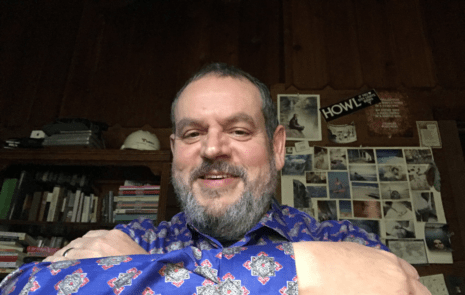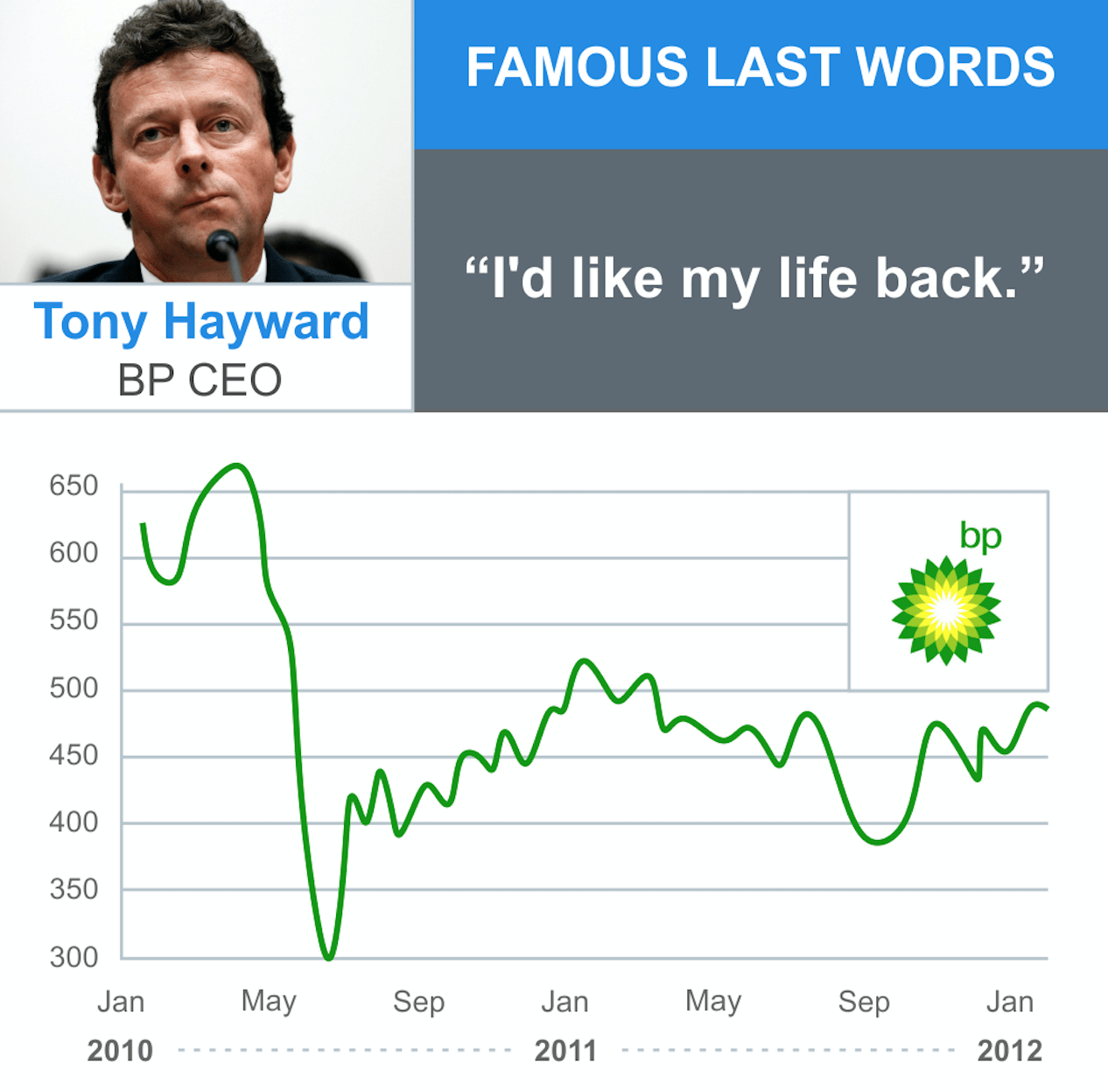
The Wrong Words End Careers
Even the world’s most powerful people can hang themselves with the wrong words. Just 5 words felled BP CEO Tony Hayward.
When a leader’s message backfires, careers and companies crash. But we can learn key lessons on what a successful message needs to do by examining messages that failed.
The story begins with Hayward’s predecessor. In 2007 BP’s refinery exploded in Texas City, killing 15 people. So BP ousted CEO John Browne, who had put profits before safety.
When Tony Hayward ascended to CEO, he had a perfect opportunity to refocus BP on safety. In fact, that’s what he promised in a speech, saying he would focus on safety “like a laser.”
But on April 20, 2010, the Deepwater Horizon oil drilling platform blew out in the Gulf of Mexico, killing 11 BP employees and triggering the largest offshore spill in U.S. history.
As BP’s burning platform spewed black smoke and oil slicks for miles – polluting the Gulf, killing sea life and crushing local economies – it turned into the most expensive, extensive environmental failure ever.
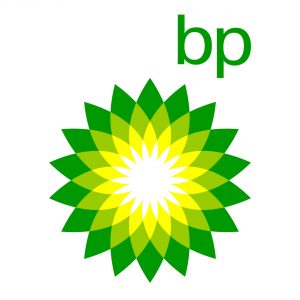
From the start, Hayward totally misread the magnitude of the accident. Rather than rush to the scene, he sent lieutenants to survey the damage.
Big mistake. In a crisis, nothing speaks louder than a leader’s absence. At a minimum, people expect a leader to show his or her face.
Behind closed doors, Hayward asked the BP executive team, “What the hell did we do to deserve this?” Then that question leaked into news media. Publicly, Hayward said that BP would take responsibility for the spill and pay the clean-up costs.
From there, everything headed downhill. Hayward began to exhibit the behaviors of a CEO caricature – distant, privileged and selfishly uncaring. As he talked about the event, he became “a gaffe machine,” said Time magazine.
President Obama visited the Gulf Coast on May 2. But Hayward didn’t, and wouldn’t, step foot on the scene for weeks to come.
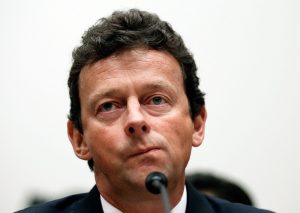
Corporate finger-pointing began. On May 4, Hayward told BBC that a Transocean blowout preventer was at fault for the leak. BP “will be judged not on the basis of an accident that, you know, frankly was not our accident,” he said.
In Congressional hearings on May 11, Transocean, Halliburton and BP blamed each other for the accident. One day later, evidence emerged that all 3 companies had ignored safety warnings.
“You had executives of BP and Transocean and Halliburton falling over each other to point the finger of blame at somebody else … it is pretty clear that the system failed, and it failed badly,” Obama said.
TV news spewed scenes of round-the-clock destruction – dying sea birds, blackened beaches, ruined fisheries – while victims voiced stories of lost livelihoods and ruined businesses. The scope of the destruction was unknowable: estimates of the size of the spill varied widely and changed frequently.
The narrative became one about an uncaring foreign company that destroyed the environment and local economy. Public sentiment against BP hardened fast.
More than a month after the blowout, finally, Hayward arrived on the Gulf Coast for an apology tour. What he needed to do was simple: show single-minded empathy for the victims, take responsibility for the accident, apologize, and promise to make things right.
But that’s not what he did. Instead, in a May 30 TV interview in Venice, Louisiana, he uttered his 5 famous last words:
“I’d like my life back.”
In seconds, he cast himself as a self-centered, sweaty foreign CEO, uncaring in the face of catastrophe, a perfect public villain.
Blowback began immediately. U.S. Representative Charlie Melancon (D-La.) called on Hayward to resign. President Obama said he would fire Hayward. Others piled on.
By June 1 BP had lost nearly half its value as a company. Its market capitalization had fallen by more than $71 billion as BP stock reached an 18-year low.
In a futile effort to sway public opinion, BP responded defensively with a $50 million TV ad campaign. Proof that no amount of advertising can recover your lost reputation.
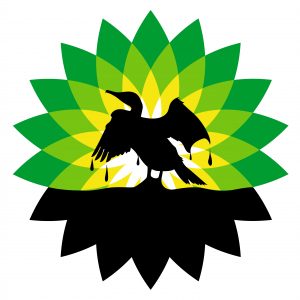
When Hayward appeared in Congress on June 17, he stonewalled lawmakers. His refusal to answer questions made a bad situation deteriorate.
As more facts came out, the crisis grew even worse. Attempts to stop the leaks were slow and stumbling.
Then news emerged that the alarms on the Deepwater Horizon, which might have saved the crew’s lives, had been switched off so as not to wake the crew at night. Worse, BP got caught falsifying a photo of a control room, using Photoshop to add in people who had not been there at the time.
By July 26, Hayward was out of a job.
What had BP’s CEO done wrong, exactly?
- By waiting weeks to visit a site where 11 employees died, he showed he didn’t care.
- By blaming other companies, he didn’t accept responsibility for the accident.
- In stonewalling Congress, he made himself look guilty.
- By sailing his yacht off the Isle of Wight during the crisis, he appeared out of touch, arrogant and aloof.
- In uttering his famous last words, he betrayed that, in the midst of a horrible catastrophe, he cared most about himself.
Yet it’s clear that Hayward might have saved himself with timely actions and the right message. He could have:
- Gone immediately to the crisis site. Mourned his dead employees. Assessed the disaster firsthand. Taken responsibility. Apologized.
- Appeared to be in control, by promising that BP would investigate what happened, establish the truth, and take steps to ensure that no such accident would ever happen again. He would not rest until the problem was solved.
- Understood that a crisis is always a victims’ story. Once victims are visible, you only get to make one choice – whether to be the hero or the villain. In not choosing to be a hero, Hayward became the infamous face of corporate villainy.
Rather than being remembered for any of his accomplishments, Hayward will always be known for his famous last words: “I’d like my life back.”
Related Posts
Top 10 Blogs of 2016 on Marketing Messages and Content Marketing
The top 10 blogs you chose to read in 2016 focused on marketing messages & content marketing. You zoomed in on 3 problems that vex and bedevil marketers...
Your calm, care and generosity will see you through
Today’s blog is about you I’m writing this blog because I want you to make it through the coronavirus crisis. Elbow bump. Virtual hug....
What do marketers want to know about content marketing? [Infographic]
“What are your top 3 content marketing questions?” That’s a question I asked hundreds of marketers in my workshops over the past year. An analysis of...
Top 100 Content Marketing Question: How should you set up your content marketing analytics?
How to set up content marketing analytics: 4 guidelines Designate one owner of content marketing analytics. Grant that manager a broad license to collect...


